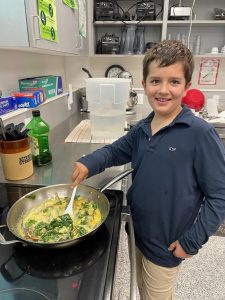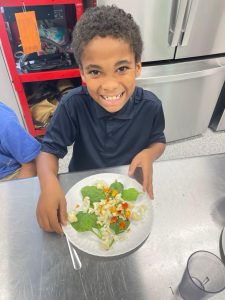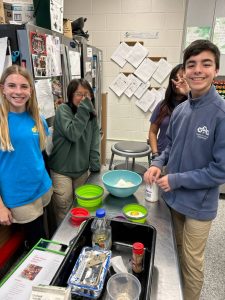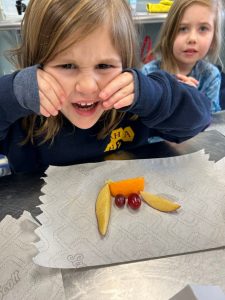 Food for Life is part of the curriculum at three Baltimore Curriculum Project (BCP) schools: City Springs Elementary / Middle School, Hampstead Hill Academy (HHA), and Pimlico Elementary / Middle School.
Food for Life is part of the curriculum at three Baltimore Curriculum Project (BCP) schools: City Springs Elementary / Middle School, Hampstead Hill Academy (HHA), and Pimlico Elementary / Middle School.
Based on a national, award-winning program created by the nonprofit Food Studies Institute, Food for Life is an experiential food education program that teaches children healthy food habits and real-life food preparation lessons. Children learn about food and nutrition in the context of what they are learning in other classes. What better way to explore the history of another country or learn practice fractions than by measuring ingredients for, as an example, to prepare a traditional Chinese meal?
BCP’s and HHA’s Food for Life History
HHA was the first BCP school to use the Food for Life program, beginning in 2004 with Ariel Demas as the first instructor. She developed and taught it for 14 years, and today, in her role as Vice President at the Food Studies Institute, continues to work with the three BCP Food for Life educators on the program.
“We are so proud of the HHA program we developed with support from Principal Hornbeck, the funding community, BCP, and of course the school community,” Ms. Demas says. “It’s a model for how to develop an experiential food education program that’s integrated into the public school system in a sustainable manner.”
 HHA’s comprehensive approach is more feast than meal. In addition to school-day classes for all students, there are several co-curricular and schoolwide programs:
HHA’s comprehensive approach is more feast than meal. In addition to school-day classes for all students, there are several co-curricular and schoolwide programs:
- An afterschool culinary arts club
- Afterschool garden club and organic school garden
- Community arts nights where students prepare and serve culinary delights to families
- Management of a schoolwide healthy fresh fruit and veggie snack program
- Healthy snacks at all school meetings
At HHA, every student from Pre-K through 8th grade receives Food for Life instruction. Pre-k and Kindergarteners come and learn in the kitchen once per week, while the 1st-8th graders have classes for two 7-day cycles per year. Classes range from 45 minutes to an hour.
 We spoke with Kristina Satterlee, HHA’s Food for Life instructor. It’s her first year teaching the program and she is a four-year veteran on the HHA faculty. Here are her thoughts on the rich and robust program:
We spoke with Kristina Satterlee, HHA’s Food for Life instructor. It’s her first year teaching the program and she is a four-year veteran on the HHA faculty. Here are her thoughts on the rich and robust program:
My curriculum is rooted in the Food is Elementary curriculum and the Maryland Comprehensive Health Education framework. I work closely with HHA’s Physical Education Educator and the Health Educator at my school to ensure that all students receive instruction on each Health standard. I also work with General Educators to incorporate their curriculum into my lessons where appropriate. For example, I recently developed a 5th grade unit on how food impacts different body systems. In order to ensure continuity, I utilized materials from the 5th grade science curriculum.
Many students encounter a slew of misinformation when it comes to health and wellness. The overall goal of the Food for Life program at HHA is to give students the knowledge, experience, skills, and confidence they need to lead healthy lives. I provide accurate information, and then allow the students to apply their new knowledge by creating simple, nutrient-rich dishes.
 Especially in the younger grades, I try to keep the parents in the loop about which foods their children enjoyed in my class. Students take colorful notes home about their favorite tastes and I snap pictures for Class DOJO [the digital parent-school communication platform].
Especially in the younger grades, I try to keep the parents in the loop about which foods their children enjoyed in my class. Students take colorful notes home about their favorite tastes and I snap pictures for Class DOJO [the digital parent-school communication platform].
One of my favorite lessons focuses on the role that carbohydrates play in our bodies and the difference between whole grain and processed grain products. Students learn that whole grains tend to be more nutrient dense because they contain all three parts of the grain- the germ, the endosperm, and the bran, whereas traditional white flour is made by removing the germ and the bran. The problem is that most of the nutrients are in the germ and the bran.
Students diagram the two types of grains and then make whole-wheat blueberry muffins. I really like this lesson because it builds on several concepts that are familiar to most kids, making it very accessible. Most kids have been told that whole wheat bread is healthier, but don’t necessarily know why. Also, most kids are familiar with blueberry muffins and already have a positive association with them. So, the lesson takes a familiar food and a familiar concept and provides a new layer of information as well as a practical way to use the new knowledge.
 My first job ever was as a baker at Dangerously Delicious Pies in Baltimore. My undergraduate degree is in Environmental Science from Connecticut College. While at Connecticut College, I became very interested in food access and sustainability through my work with the school garden and my on-campus job as a catering supervisor. I culminated my degree with an honors thesis on urban agriculture movements in Mumbai, India, and New York City, NY. I then served with City Year, NY, an Americorps program focused on supporting high-poverty schools in the Bronx. I returned to Baltimore and worked as an Assistant Teacher while enrolled in Notre Dame’s education program. When this position opened up last year, I was beyond excited to be able to bring my passion for education, food, and gardening together in the Food For Life kitchen. Quite the dream job!
My first job ever was as a baker at Dangerously Delicious Pies in Baltimore. My undergraduate degree is in Environmental Science from Connecticut College. While at Connecticut College, I became very interested in food access and sustainability through my work with the school garden and my on-campus job as a catering supervisor. I culminated my degree with an honors thesis on urban agriculture movements in Mumbai, India, and New York City, NY. I then served with City Year, NY, an Americorps program focused on supporting high-poverty schools in the Bronx. I returned to Baltimore and worked as an Assistant Teacher while enrolled in Notre Dame’s education program. When this position opened up last year, I was beyond excited to be able to bring my passion for education, food, and gardening together in the Food For Life kitchen. Quite the dream job!
Thanks, Ms. Satterlee, for your passion and terrific instruction!
